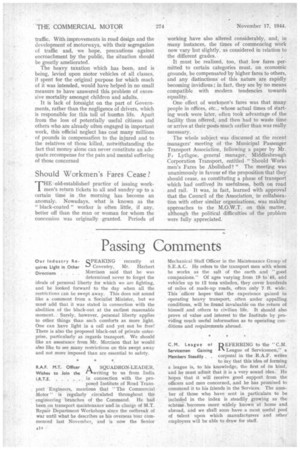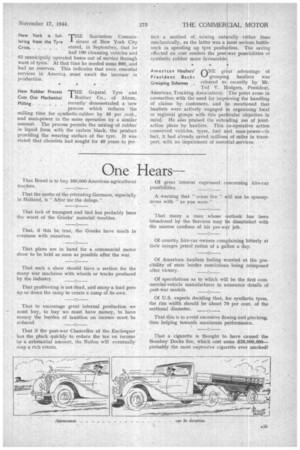Passing Comments
Page 16

Page 17

If you've noticed an error in this article please click here to report it so we can fix it.
Our In ReQPEAKING recently at quires Light in Other ‘--7 Coventry, Mr. Herbert
Directions . . . Morrison said that he was
determined never to forget the ideals of personal liberty for which we are fighting, and he looked forward to the day when all the restrictions can be swept away. This does not sound like a comment from a Socialist Minister, but we must add that it was stated in connection with the abolition of the black-out at the earliest reasonable moment. Surely, however, personal liberty applies to other things than such comforts as more light. One can have light in a cell and yet not be free! There is also the proposed black-out of private enterprise, particularly as regards transport. We should like an assurance from Mr. Morrison that he would also like to see many restrictions on this swept away and not more imposed than are essential to safety.
R.A.F. M.T. Officer A SQUADRON-LEADER,
Wishes to Join the writing to us from India Wishes to Join the writing to us from India I. R.T. E. in connection with the pro
posed Institute of Road .Transport Engineers, mentions that "The Commercial Motor" is regularly circulated throughout the engineering branches of the Command. He had been on transport maintenance'anel in charge of M.T. Repair Department Workshops since the outbreak of war until what he describes as his overseas tour commenced last November, and is now the Senior
Mechanical Staff Officer in the Maintenance Group of S.E.A.C. He refers to the transport men with whom he works as the salt of the earth and "good companions." Of ages varying from 19 to 45, and vehicles up to 12 tons unladen, they cover hundreds of miles of made-up roads, often only 7 ft. wide. This officer hopes that the experience gained in operating heavy transport, often under appalling conditions, will be found invaluable on the return of himself and others to civilian life. It should also prove of value and interest to the Institute by providing much useful information as to operating conditions and requirements abroad.
C.M. League or pp EFERRING to the " C.M. Servicemen Gaining .1‘. League of Servicemen," a Members Steadily . . corporal in the R.A.F. writes
to'Say that this idea of forming a league is, to his knowledge, the first of its kind, and he must admit that it is a very sound idea. He hopes that it will receive good support from the officers and men concerned, and he has promised to commend it to his friends in the Services. The number of those who have sent in particulars to be included in the index is steadily growing as the scheme becomes more widely known at home and abroad, and we shall soon have a most useful pool of talent upon which manufacturers and other' employers will be able to draw for staff.
New York is SOTHE Sanitation Commis tering from the Tyre sioner of New York City
Crisis, stated, in September, that he had 100 cleansing vehicles and 62 municipally operated buses out of service through want of tyres. At that time he needed some 800, and had no reserves. This indicates that even essential services in America must await the increase in production.
New Rubber Process THE General Tyre and Cuts Out Mechanical I Rubber Co., of Akron,
Milling recently demonstrated a new process which reduces the milling time for synthetic-rubber by 35 per cent., and man-power in the same operation by a similar amount. The process permits the mixing of rubber in liquid form with the carbon black, the product providing the wearing surface of the tyre. It was stated that chemists had sought for 40 years to per
t than
mechanically, a method of mixing nat rally rather an
mechanically, as the latter was a i ost serious bottleneck in speeding up tyre produ tion. The saving effected on cost renders the post war possibilities of synthetic rubber more favourable 0"gr at advantage of grouping hauliers was referred to recently by Mr. Ted V. Iodgers, President American Trucking Associations. The point arose in connection with the need for imp1oving the handling of claims by customers, and 1e mentioned that hauliers were actively engaged in organizing local or regional groups with this pa lcular objective in mind.. He also praised the extelding use of jointaction plans by hauliers. This fo-operative action conserved vehicles, tyres, fuel an d man-power—in fact, it had already saved millioni of miles in transport, with no impairment of essential services.
Am e ri ca n Hauliers' President Backs Grouping Schemes .




















































